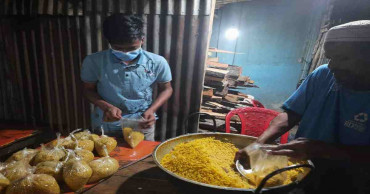Activists
Egypt sentences 14, including activists on terrorism charges
Egypt on Sunday sentenced 14 people, including rights activists, to prison terms ranging between five and 15 years on terrorism-related charges in a trial deplored by rights groups as unfair.
The verdicts — the latest mass sentencings in Egypt — were reported by the Egyptian Initiative for Personal Rights, one of the country's most prominent human rights. The suspects were arrested in 2018 as part of a wide-ranging crackdown by authorities on dissent.
Two activist lawyers — Ezzat Ghoniem of the Egyptian Coordination for Rights and Freedoms and Mohamed Abu Horarira — were sentenced to 15 years in prison each. They were convicted of joining and funding a terrorist group, which is government parlance for the Muslim Brotherhood.
Egyptian authorities designated the Islamist group a terrorist organization in 2013, the year the military removed Egyptian President Mohammed Morsi, who hailed from the Brotherhood, from power after a year of divisive rule.
Also Read: COP27: Momen thanks Egypt for focusing on "loss and damage" issue
Abu Horarira's wife, Aisha el-Shater, who is also the daughter of Khairat el-Shater, long seen as the Brotherhood’s most powerful leader, was sentenced to 10 years on charges that also included disseminating false news on allegations of rights abuses by security forces.
Huda Abdel-Moneim, another lawyer and activist, was handed a five-year sentence.
The court added a five-year probation period at the end of each sentence of those convicted, which includes a travel ban and an order to regularly report to a police station.
Amnesty International and other rights group have decried the arrest of the 14 and said their trial reflected “gross violations of their right to a fair trial.”
Sunday’s verdicts are not subject to appeal and only the country’s president has the authority to pardon or throw out the sentences.
Rights groups have repeatedly criticized mass sentencings, common over the past years in Egypt in trials related to the Brotherhood or dissent, and called on authorities to ensure fair trials.
Egypt’s government has in recent years jailed thousands, mainly Islamists, but also secular activists involved in the 2011 Arab Spring uprising that toppled the country's longtime autocratic President Hosni Mubarak.
2 years ago
Hong Kong court convicts activists behind Tiananmen vigil
Three Hong Kong activists from a now-defunct group that organized annual vigils commemorating China’s 1989 crackdown on pro-democracy protesters were convicted on Saturday for failing to provide authorities with information on the group in accordance with a national security law.
Chow Hang-tung, Tang Ngok-kwan and Tsui Hon-kwong were arrested in 2021 during a crackdown on the city’s pro-democracy movement following massive protests more than three years ago. They were leaders of the Hong Kong Alliance in Support of Patriotic Democratic Movements of China before it disbanded under the shadow of the Beijing-imposed law.
The alliance was best known for organizing candlelight vigils in Hong Kong on the anniversary of the Chinese military’s crushing of the 1989 Tiananmen Square pro-democracy protests. Critics say its shutdown has shown freedoms that were promised when Hong Kong returned to China in 1997 are eroding.
Before the group voted to disband, police had sought details about its operations and finances in connection with alleged links to democracy groups overseas in August 2021, accusing it of being a foreign agent.
But the group refused to cooperate, arguing police were arbitrarily labeling pro-democracy organizations as foreign agents. It added the police did not have a right to ask for its information because it was not a foreign agent and the authorities did not provide sufficient justification.
Under the security law’s implementation rules, the police chief can request a range of information from a foreign agent. Failure to comply with the request could result in six months in jail and a fine of 100,000 Hong Kong dollars ($12,740) if convicted.
On Saturday, principal magistrate Peter Law ruled the defendants were obliged to answer the notice served to them, which he called “sound and legal,” and their non-compliance was unjustified.
The alliance had been actively operating with various entities and people abroad, Law said, so it was necessary to explore their dealings and connections to determine their affiliation and ultimate purpose.
“Such requirement for information was nothing like a broad-brush fishing exercise but rather was constrained in terms of periods of time and nature,” he said. “The police had taken an abstemious and self-restrained approach.”
During previous legal proceedings, the court ordered a partial redaction of some information after prosecutors argued that a full disclosure of information would jeopardize an ongoing probe into national security cases.
The undisclosed details in a redacted police report submitted to the court include the names of groups that were alleged to have links with the alliance.
“Leaking of secret information, such as identities, strategies and interim investigation results of others would definitely seriously jeopardize the ongoing investigation,” Law said on Saturday.
The annual vigil organized by the alliance was the only large-scale public commemoration of the June 4th crackdown on Chinese soil and was attended by massive crowds until authorities banned it in 2020, citing anti-pandemic measures.
Chow, along with two other former alliance leaders, Lee Cheuk-yan and Albert Ho, were charged with inciting subversion of state power under the security law in 2021. The alliance itself was charged with subversion.
The national security law criminalizes secession, subversion, and collusion with foreign forces to intervene in the city’s affairs as well as terrorism. Apart from the activists, pro-democracy publisher Jimmy Lai is also facing collusion charges under the law, which has already jailed or silenced many dissidents.
In Beijing, Wang Chao, spokesperson for the National People’s Congress, China's legislature, hailed the enactment of the law in 2020 as an important milestone in the practice of the “one country, two systems” governing principle.
The principle promises the former British colony the right to retain its own political, social and financial institutions for 50 years after the 1997 handover.
“Hong Kong has had a major turn from chaos to stability,” he said.
3 years ago
25 BNP leaders, activists detained over road march in Bagerhat
Police today detained some 25 BNP activists and leaders, including a central leader, on charges of attempts to carry out subversive activities and chaos following a road march in Bagerhat district.
BNP, however, claimed that police held at least 40 leaders and activists from different areas after a “peaceful” road march in the district.
The detainees included central assistant publicity secretary Shamimur Rahman Shamim, district unit BNP’s former president MA Salam, its incumbent convener ATM Akram Hossain Selim Talim, and another leader Ali Robi, among others.
Also Read: Police prevented BNP’s road march in Patuakhali, local leaders say
Protesting the detainment and obstruction to their programme, BNP central committee Education Affairs Secretary ABM Dr Obaidul Islam at an instant press conference at Bagerhat Press Club around 11am alleged that at least 40 BNP men were detained centring the road march over several demands including resignation of the government and controlling price hike of essentials.
The BNP leader also announced a programme to be observed at each police station in all metropolitan cities on March 4, protesting the obstruction and detention of their party members across the country today.
Md Asaduzzaman, superintendent of police in the district, said they apprehended some 20 to 25 BNP men after receiving information that the party men were hatching plans to carry out subversive activities and disorder in the name of the road march.
Verification was going on about the detainees and legal actions will be taken in this connection later, the SP added.
3 years ago
German coal mine clash pits laws against climate
The fate of a tiny village has sparked heated debate in Germany over the country’s continued use of coal and whether tackling climate change justifies breaking the law.
Environmental activists have been locked in a standoff with police who started eviction operations on Wednesday in the hamlet of Luetzerath, west of Cologne, that’s due to be bulldozed for the expansion of a nearby lignite mine. Some stones and fireworks were thrown at officers in riot gear, who could be seen dismantling stalls set up by protesters.
Protesters refused Tuesday to heed a court ruling effectively banning them from the area. Some dug trenches, built barricades and perched atop giant tripods in an effort to stop heavy machines from reaching the village, before police pushed them back by force.
“People are putting all of their effort, all of their lives into this struggle to keep the coal in the ground,” said Dina Hamid, a spokesperson for the activist group Luetzerath Lives.
“If this coal is burned, we’re actually going to take down our climate goals,” she said. “So we’re trying to, with our bodies, protect the climate goals.”
The debate flared up hours later at a townhall meeting in nearby Erkelenz, when one regional official accused activists of being willing to “spill human blood” to defend the now-abandoned village.
Also Read: Climate activists dig in to defend village from coal mine
Stephan Pusch, who heads the district administration, said that while he sympathized with the protesters’ aims, the time had come to give up Luetzerath. The village’s last resident left in 2022 after being forced to sell to utility company RWE.
“You’ve achieved your goal. Now clear the pitch,” he said to jeers from the room.
Many disagreed, arguing that the village is more than just a potent symbol for the need to stop global warming.
Studies indicate that about 110 million metric tons of coal could be extracted from beneath Luetzerath. The government and RWE say this coal is needed to ensure Germany’s energy security — squeezed by the cut in supply of Russian gas due to the war in Ukraine.
Critics counter that burning so much coal would make it much harder for Germany, and the world, to cap global warming at 1.5 degrees Celsius (2.7 Fahrenheit) as agreed in the 2015 Paris climate accord.
“Nobody wants to be out there in the cold right now, defending a forest or a village,” said Maya Rollberg, a 26-year-old student who had traveled from southern Germany. “But I think that people have realized that they have to do that in order to (protect) future generations.”
Dietmar Jung, a retired priest attending the meeting, said he was tired of hearing officials say the law was on the side of RWE.
“They keep going back to the legal situation,” he said. “But the right to live doesn’t play a role here (for them).”
Pusch, the regional administration chief, warned protesters that intentionally breaking the law wouldn’t help their cause in a country where the violent seizure of power and the horrors of dictatorship are still within living memory.
“I’ll tell you honestly that I’m scared my children will grow up in a world that isn’t worth living in anymore,” he said. “But I’m at least as scared of my children growing up in a country where everyone takes the law into their own hands.”
“You won’t save the world’s climate on your own,” said Pusch. “(We’ll) only do so if we manage to take the majority of the population with us.”
Similar debates over how far civil disobedience can go have taken place in Germany and elsewhere in recent months amid a wave of road blockades and other dramatic actions by protesters demanding tougher measures to combat climate change.
Some climate activists say the law is ultimately on their side, citing a 2021 ruling by the country’s supreme court that forced the government to step up its effort to cut emissions. They also note the legally binding nature of Germany’s commitments under the Paris accord.
Speaking after the townhall meeting, student Jannis Niethammer acknowledged that the dispute over Luetzerath touches on fundamental issues. “It’s a question of democracy and how do we actually get a democracy to move toward climate protection, toward climate justice,” he said.
Janine Wissler, a federal lawmaker and co-leader of the opposition Left party, suggested the way out would be for the government to reverse its decision allowing the village to be razed.
“If we want to achieve our climate targets and take the Paris climate agreement seriously, then the coal beneath Luetzerath needs to stay in the ground,” she told The Associated Press on the sidelines of the protest.
Wissler criticized an agreement struck last year between the government and utility company RWE to permit mining beneath the village in return for an earlier end to coal use in Germany. Some experts say that, in sum, the deal will lead to higher emissions.
“We’re already experiencing droughts, famines and floods. Climate change is happening already,” she said. “And therefore wrong decisions need to be corrected.”
3 years ago
BCL faction demands justice for police attack on activists
A faction of central Chhatra League panel staged a demonstration rally demanding justice for the police attack on their activists at Barguna.
The rally was formed in front of anti terrorist Raju monument of Dhaka University at 5pm Tuesday.
Present and former leaders of BCL central panel joined the human chain.
Demanding proper justice and expulsion of ASP Maharram, vice president of current BCL central panel Iyaj Al Riyad said, " August is the month of mourning. We never thought that we would have to stand here to demand justice for police attack on our activists."
He also condemned the briefing of Barguna Chhatra League president for his previous public statement and demanded an investigation into whether they were forced by BCL central president or secretary to give that statement.
Later, he demanded the resumption of student politics on BUET campus, saying that "BUET has been made a safe Cantonment of JCD and Shibir as they tried to foil the program of Bangabandhu in the campus."
Read: ASP withdrawn after cops charge baton on Barguna BCL activists
Former BCL vice president Chanchal Karmakar said, "Police, who led attack on Barguna Chhatra League during the mourning program of Bangabandhu, was an active activist of JCD during his student life and still he is serving BNP by beating up BCL activists. That ASP Maharram must be expelled for showing his courage to disgrace the MP of Barguna. "
"Those who tried to foil the program related to Bangabandhu in the BUET campus shall be identified and provided with due punishment for such heinous activity. No one except Shibir activists can do this," he added.
Among others, BCL vice president Shohan Khan, Sayed Arif Hossen, SM Mamun, Sardar Mamunur Rashid, Sakib Hasan Sohel and some other central members and leaders were present in the human chain.
3 years ago
ARTICLE 19 to support troubled journalists, activists in Bangladesh
ARTICLE 19 has invited journalists and activists from Bangladesh to submit their applications to avail of assistance to be provided in three areas - legal, medical and alternative livelihoods.
The human rights organization will provide support to journalists, human rights defenders (HRD) and social media activists who have been subjected to distress due to exercise of their right to freedom of expression and professional duties, said a media release on Tuesday.
The rights body has requested eligible beneficiaries to submit their applications by June 30 and the applicants must be citizens of Bangladesh.
3 years ago
45 Jamaat leaders, activists arrested from Noakhali during ‘anti-govt’ meeting
Police arrested 45 leaders and activists of Jamaat-e-Islami on Sunday while they were holding an anti-government meeting in Noakhali.The arrests were made following a tip off, around 12:30 pm while the Jamaat members were holding a secret meeting at the second floor of Al-Farooq Academy at Maijdi said Md Shahidul Islam, Additonal Superintendent of district police.“During the arrest several provocative books on religious aggression were recovered from which we suspect they were planning anti-government activities to create an unstable situation, capitalizing religious sentiments,” said the ASP.
Also read: Rajshahi city Jamaat secretay held over vandalismSome of the arrestees are Md Hanif, 52, Amir of Shonaimuri upazila Jamaat, Mowlana Omar Faruq, 52, General Secretary of Chatkhil upazila Jamaat, Mohiuddin Hasan, 48, General Secretary of Shenbag upazila Jamaat, Enayet Ullah, 42, Office Secretary of Kabirhat upazila Jamaat, Belayet Hossain, 52, of Assistant Secretary of Companyganj upazila Jamaat, Nur Hossain, 35, Amir of Chatkhil municipality Jamaat, said Md Jakir Hossain, officer-in-charge of Shudharampur Model police station.
Also read: Jamaat leader's son in Palashbari AL, claims local leader“Police filed a case against the arrested under the Special Power Act. The arrestees were sent to jail in the afternoon after producing them before court,” said OC Jakir Hossain.
3 years ago
BCL activists get 2-months jail for misconduct with magistrate
A Sylhet magistrate on Tuesday sentenced two Bangladesh Chaatra League activists to two months in prison for misbehaving with him (the magistrate) during an anti-electric vehicle drive in the city.
The two accused were identified as Mazed Ahmed, 27, and Tarek Ahmed, 30, both members of the Sylhet district unit of BCL.
READ: Clash between BCL factions at CMCH; several injured, 16 sued
The incident occurred when executive magistrate of Sylhet City Corporation Md Motiur Rahman Khan, leading a mobile court, went to fine Mazed for wrongly parking his motorcycle at Ambor Khan point.
As the magistrate asked to see his driving license and other documents, Mazed said: "I have no documents, but I have links with the top people in the administration. I will see how you seize my bike."
He called out another BCL man, Tarek, to join him and then both of them allegedly misbehaved with the magistrate.
READ: Counter-FIR filed over BCL clash at Ctg medical college
At one point the magistrate too called on additional police forces and had them arrested.
"Tarek and Majed have been sentenced to two months in prison under section 186 of Penal Code," said Motiur Rahman.
Both of them were sent to jail around 3:30 pm.
4 years ago
Activists allege Myanmar leaders are ‘weaponizing’ COVID-19
With coronavirus deaths rising in Myanmar, allegations are growing from residents and human rights activists that the military government, which seized control in February, is using the pandemic to consolidate power and crush opposition.
In the last week, the per capita death rate in Myanmar surpassed those of Indonesia and Malaysia to become the worst in Southeast Asia. The country’s crippled health care system has rapidly become overwhelmed with new patients sick with COVID-19.
Supplies of medical oxygen are running low, and the government has restricted its private sale in many places, saying it is trying to prevent hoarding. But that has led to widespread allegations that the stocks are being directed to government supporters and military-run hospitals.
At the same time, medical workers have been targeted after spearheading a civil disobedience movement that urged professionals and civil servants not to cooperate with the government, known as the State Administrative Council.
Also read: Myanmar: Expert calls for “COVID ceasefire”; urges new UN resolution
“They have stopped distributing personal protection equipment and masks, and they will not let civilians who they suspect are supporting the democracy movement be treated in hospitals, and they’re arresting doctors who support the civil disobedience movement,” said Yanghee Lee, the U.N.’s former Myanmar human rights expert and a founding member of the Special Advisory Council for Myanmar.
“With the oxygen, they have banned sales to civilians or people who are not supported by the SAC, so they’re using something that can save the people against the people,” she said. “The military is weaponizing COVID.”
Myanmar’s Deputy Information Minister Zaw Min Tun did not respond to questions about the allegations, but with growing internal and external pressure to get the pandemic under control, the leadership has been on a public relations offensive.
In the state-run Global New Light of Myanmar newspaper this week, several articles highlighted the government’s efforts, including what it called a push to resume vaccinations and increase oxygen supplies.
Senior Gen. Min Aung Hlaing, the head of the government, was cited as saying that efforts were also being made to seek support from the Association of Southeast Asian Nations and unspecified “friendly countries.”
Also read: Myanmar caught off guard as cases surge, oxygen dwindles
“Efforts must be made for ensuring better health of the State and the people,” he was quoted as saying.
Myanmar reported another 342 deaths Thursday, and 5,234 new infections. Its 7-day rolling average of deaths per 1 million people rose to 6.29 — more than double the rate of 3.04 in India at the peak of its crisis in May. The figures in Myanmar are thought to be a drastic undercount due to lack of testing and reporting.
“There is a big difference between the actual death toll from COVID-19 of the Military Council and reality,” a physician from the Mawlamyine General Hospital in Myanmar’s fourth-largest city told The Associated Press, speaking on condition of anonymity for fear of government reprisal. “There are a lot of people in the community who have died of the disease and cannot be counted.”
Videos proliferate on social media showing apparent virus victims dead in their homes for lack of treatment and long lines of people waiting for what oxygen supplies are still available. The government denies reports that cemeteries in Yangon have been overwhelmed but announced Tuesday they were building new facilities that could cremate up to 3,000 bodies per day.
“By letting COVID-19 run out of control, the military junta is failing the Burmese people as well as the wider region and world, which can be threatened by new variants fueled by unchecked spread of the disease in places like Myanmar,” said Phil Robertson, deputy Asia director of Human Rights Watch. “The problem is the junta cares more about holding on to power than stopping the pandemic.”
Myanmar is one of the region’s poorest countries and already was in a vulnerable position when the military seized power, triggering a violent political struggle.
Under the civilian former leader Aung San Suu Kyi, Myanmar had weathered a coronavirus surge last year by severely restricting travel and sealing off Yangon. Vaccines were secured from India and China, but Suu Kyi’s government was ousted less than a week after the first shots were given.
As civil disobedience grew after Suu Kyi’s removal, public hospitals were basically closed as doctors and other staff refused to work under the new administration, instead running makeshift clinics for which they faced arrest, if caught.
Some have returned to public hospitals, but the Mawlamyine doctor interviewed by AP said it was too dangerous.
“I could be arrested by the junta anytime if I returned to the hospital,” added the doctor, who was part of the disobedience movement and has been treating patients with supplies he has scrounged.
According to Tom Andrews, the U.N. Human Rights Council’s independent expert on human rights in Myanmar, government forces have engaged in at least 260 attacks on medical personnel and facilities, killing 18. At least 67 health care professionals had been detained and another 600 are being sought.
Military hospitals kept operating after Suu Kyi’s ouster but were shunned by many people and the vaccination program slowed to a crawl before apparently fizzling out completely until this week. There are no solid figures on vaccinations, but it’s believed that about 3% of the population could have received two shots.
The rapid rise in COVID -19 illnesses is “extremely concerning, particularly with limited availability of health services and oxygen supplies,” said Joy Singhal, head of the Red Cross’ Myanmar delegation.
“There is an urgent need for greater testing, contact tracing and COVID-19 vaccinations to help curb the pandemic,” he told AP. “This latest surge is a bitter blow to millions of people in Myanmar already coping with worsening economic and social hardships.”
Earlier this week, Andrews urged the U.N. Security Council and member states to push for a “COVID cease-fire.”
“The United Nations cannot afford to be complacent while the junta ruthlessly attacks medical personnel as COVID-19 spreads unchecked,” he said. “They must act to end this violence so that doctors and nurses can provide lifesaving care and international organizations can help deliver vaccinations and related medical care.”
After a long lull in humanitarian aid, China recently began delivering vaccines. It sent 736,000 doses to Yangon this month, the first of 2 million being donated, and reportedly more than 10,000 to the Kachin Independence Army, which has waged a decades-long insurgency in a northern border area where the virus has spilled over into China.
Chinese Foreign Ministry spokesman Zhao Lijian declined to comment directly earlier this week on the report of the delivery to the KIA, noting instead “the epidemic is a common enemy to all mankind.”
The Global New Light reported Myanmar received another 1 million doses purchased from China.
COVID-19 outbreaks have been reported as widespread in Myanmar’s prisons. On Wednesday, state-run MRTV television showed what it said were 610 prisoners from Yangon’s Insein Prison being vaccinated. The report was met with skepticism and derision on social media.
Lee said if the government is trying to use vaccines and other aid to its advantage by positioning itself as the solution to the pandemic, it’s too late.
“The people know now and it’s been too long,” she said. “COVID was not manmade but it got out of proportion because of complicity and deliberate blockage of services — there’s no going back.”
4 years ago
Lockdown: Youths respond as ‘ food crisis looms’ in Faridpur
A group of youth is reaching out to the people in need in Faridpur town at night, feeding as many people as they can amid the coronavirus lockdown.
Also read: Lockdown unproductive due to mismanagement: BNPActivists of the Communist Party and the Chhatra Union are distributing packets of hotchpotch (khichuri) among the helpless people throughout the town.The government enforced a weeklong lockdown to contain the transmission of coronavirus. It has been strict at some places and lax at others.
4 years ago






.jpg)
.jpg)
.jpg)






